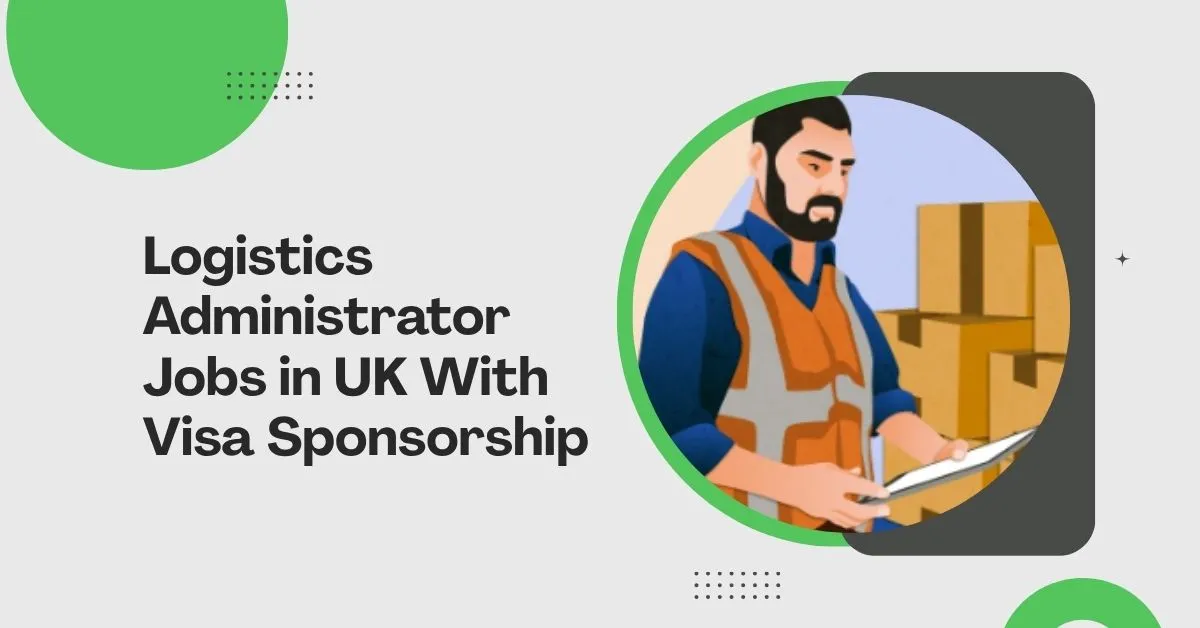The UK’s thriving logistics sector is the backbone of its economy, and skilled administrators are in high demand to ensure the smooth flow of goods across complex global supply chains. Logistics Administrator Jobs in UK with Visa Sponsorship present a fantastic opportunity for detail-oriented and organized international professionals to build a stable and rewarding career. This role is critical for businesses, offering a dynamic work environment where no two days are the same.
To secure a sponsored position, you will need to meet specific requirements, including at least one year of administrative experience, proficiency with logistics software, and a solid understanding of basic accounting and inventory management.
The benefits of succeeding are significant. You can expect a competitive average salary of £29,215 per year, opportunities for career progression into management, and the chance to live and work in a country with a high standard of living. If you are a proactive problem-solver with excellent organizational skills, this could be your pathway to a new life in UK.
Requirements of Logistics Administrator Jobs in UK
- Work Experience: Prior experience as a Coordination Director, Warehouse Administrator, or in a similar role is required.
- Logistics Software Knowledge: It is necessary to know how to use logistics tools or transport management systems.
- Basic Accounting Knowledge: It is important to understand the basics of bookkeeping.
- Organizational and Time-Management Skills: It’s important to be very good at organizing things and managing your time.
- Communication Skills: To work well with your team and managers, you need to be able to communicate clearly.
Educational Qualifications:
- Administrative Experience: At least one year of experience in an administrative job is required.
- Record-Keeping Skills: Proficiency in maintaining accurate records is important.
- Interpersonal and Organizational Aptitudes: It is necessary to be able to speak clearly at all levels and be very organized. Ability to communicate effectively at all levels and strong organizational skills are required.
- Computer Literacy: Very good computer skills; can use Word, Excel, and PowerPoint well.
- Teamwork and Independence: Being able to work alone or with others is important.
- Management Skills: You must have great management skills.
- Logistics Software Expertise: able to use logistics software to make processes run more smoothly.
Jobs Responsibilities of Logistics Administrator in UK
Shipment Planning and Coordination:
- Plan orders based on what items are available and what customers want.
- Coordinate the steps in the supply chain to get the best quality deliveries.
Order Tracking and Delivery Management:
- Track orders to make sure they get delivered on time.
- Tell your customers what’s going on with their orders.
Shipping Documentation and Reporting:
- Get things like paperwork, purchase orders, and bills of lading ready for shipping.
- Keep notes of orders, suppliers, and customers that are up to date.
Inventory and Stock Management:
- Watch how much stock is in the delivery center and place orders as needed.
- Take care of the warehouse’s stock, making sure it’s correct and available.
Scheduling and Staff Coordination:
- Divide up the shifts for the office workers and drivers.
- Keep the staff list up to date.
Administrative and Organizational Duties:
- Do the routine work that your boss tells you to.
- Make sure that the papers you file and store are up to date.
Supplier and Client Liaison:
- Talk to clients, suppliers, and makers to make sure everything runs smoothly.
- Giving correct data about orders and shipping is important.
Recruitment and Staff Management:
- Help find people to hire and manage staff according to company rules.
Financial and Budget Management:
- Help make spending reports and keep an eye on them.
- Help with putting together financial reports for logistics activities.
Data Management and Software Logging:
- Using company tools, keep track of and log information about logistics.
Benefits of Logistics Administrator Jobs in UK:
- Global Opportunities: Logistics is a global field that gives workers the chance to work with vendors, suppliers, and delivery networks from other countries. This can create a lively and varied workplace where people can be sent anywhere in the world.
- Diverse Job Roles: Logistics includes a lot of different tasks, such as transporting goods, keeping track of inventory, and making the supply chain work better. This variety lets workers learn about different parts of logistics and build their skill set.
- Critical Role in the Supply Chain: Logistics is an important part of the supply line. People who work in this field are very important to the success of economies and businesses because they make sure that things can move easily.
- Problem-Solving Opportunities: Logistics workers often have to deal with problems like interruptions in the supply chain, finding the best routes, and keeping track of inventory. Taking on these difficult problems can be mentally stimulating and give you a sense of achievement.
- Career Advancement: People who are good at and have experience with logistics can move up to top positions like operations manager, logistics manager, or supply chain director. This makes it clear how to advance professionally.
- High Demand for Skills: As e-commerce and business globalization continue to grow, there is a greater need for skilled logistics experts. This desire makes jobs safer and opens up more career paths.
- Technology Integration: Artificial intelligence, data analytics, and robotics are just a few of the cutting-edge technologies that are used in logistics. People who work in this field can use cutting-edge tools that make their work faster and more accurate.
- Dynamic Work Environment: Logistics is an area that is always changing, so you need to be able to adapt to new situations. This might be appealing to people who like working in a place where things are always changing.
- Collaboration with Stakeholders: People who work in logistics often work together with a wide range of partners, such as manufacturers, suppliers, distributors, and transportation companies. Working together improves people skills and grows business networks.
- Industry Variety: A lot of different fields, like manufacturing, retail, healthcare, and technology, rely on logistics. Because of this variety, professionals can work in fields that interest them.
- Cost Reduction: Logistics management that works well can help businesses save a lot of money. People who can come up with cost-effective supply chain solutions are in high demand in the field.
- Impact on International Trade: People who work in logistics are very important to foreign trade because they help move goods across borders. Doing these kinds of things can make you feel like you’re making a difference in the world economy.
Salary:
In the United Kingdom, the average pay for a coordinator is £29,215 a year, or £14.98 an hour. Section-level jobs start at £23,814 a year, while most experienced experts make up to £50,000 a year.
Visa Requirements
In order to be sponsored to work as a logistics administrator in the UK, foreign nationals need to fulfill certain visa requirements. The Skilled Worker Visa, formerly known as the Tier 2 General Visa, is the most popular visa for these positions. The main prerequisites for a visa are as follows:
1. Eligibility Criteria for the Skilled Worker Visa
- Job Offer: A legitimate job offer from a UK employer who is an authorized sponsor under the UK Home Office system is required in order to be eligible for a skilled worker visa. The employer must provide a position that is on the approved employment list and satisfies the necessary skill level (RQF level 3 or higher).
- Eligible Occupation: According to the Standard Occupational Classification (SOC) classification, which is required for visa applications, logistics administrator professions normally qualify as skilled occupations.
- Minimum Salary: In order to be eligible for sponsorship, the position must pay the minimum salary. The minimum wage is typically £10.75 per hour or £26,200 per year, whichever is higher. However, depending on the position and sector, different salaries may be needed.
- English Language Proficiency: Candidates must exhibit their command of the English language. This can be demonstrated by:
- A degree taught in English, or
- An English language test (e.g., IELTS or equivalent) to meet the required score level.
- Certificate of Sponsorship (CoS): A Certificate of Sponsorship (CoS), a special reference number that you must include with your visa application, will be provided by your company. This demonstrates that your application is being sponsored by your employer.
2. Required Documentation for the Visa Application
- Valid Passport: In order to apply, you must possess a current passport or other travel document.
- Sponsorship Certificate (CoS): This document, which was issued by your company, attests to your employment and job information.
- Proof of English Language Proficiency: Verification of your proficiency in the English language, either by a language exam or an authorized qualification.
- Proof of Funds: When you get to the UK, you need to have enough cash on hand to sustain yourself. In the absence of confirmation from your sponsor that they would pay for your upkeep, the UK Home Office wants proof of savings of at least £1,270.
- Police Certificate (if needed): If you’ve lived in a particular country for a long time, you might need to provide a police certificate with your application
Recruitment Agencies & Job Platforms
- Contract Personnel Ltd UK staffing agency actively hiring for logistics, supply chain, inventory, and admin roles, and known to support visa sponsorship for qualified foreign applicants in logistics sectors.
- Hays Recruitment UK Large UK recruitment firm with a logistics & supply chain job portal where you can filter for visa sponsorship roles (e.g., logistics coordinator, logistics administrator) posted by sponsoring employers.
- Reed UK One of the UK’s biggest job boards and recruitment agencies. Create job alerts for logistics & supply chain jobs with visa sponsorship it lists many advertised visa‑eligible logistics positions.
- CV Screen (Logistics & Supply Chain Focus) Specialist agency recruiting across logistics roles (coordinator, imports admin, supply chain support). While they work widely in the sector, sponsorship depends on employer demand.
- Indeed UK Not an agency per se, but a major job search engine where many employers clearly state “UK visa sponsorship available” in logistics and admin roles (such as Transport Operations Coordinator / Logistics Administrator). You can upload your CV and set visa‑sponsorship filters.
- LinkedIn Jobs Powerful platform to search visa sponsorship logistics jobs and connect directly with recruiters at companies hiring for logistics administrator or supply chain roles across the UK. (General industry knowledge)
- WarehouseJob.com / Supply Chain Recruiters Job boards focused on warehouse and supply chain roles; some listings partner with UK recruiters who can connect international candidates to sponsoring companies.
Conclusion:
In the UK, being a logistics administrator means taking on difficult tasks, growing as a professional, and working in a fast-paced, global field. This job is perfect for people who are adept at organizing, know a lot about logistics, and want to help make the supply chain more successful and efficient. The company will pay well, and there are chances to move up. If you have the right skills and want to make a big change in your work, you might want to apply for this logistics administrator job in UK.
Frequently Asked Questions:
What are the key responsibilities of a logistics administrator?
A logistics administrator is responsible for managing and coordinating the supply chain operations. This includes scheduling deliveries, maintaining records of inventory and shipments, liaising with suppliers and customers, and ensuring timely processing of orders.
What qualifications are required to become a logistics administrator in the UK?
Most logistics administrator positions require a good level of education (typically GCSEs or A-Levels) and relevant experience in logistics, administration, or supply chain management. It’s also often necessary to have familiarity with software such as Microsoft Office and logistics software.
What is the average salary for a logistics administrator in the UK?
The average salary for a logistics administrator in the UK ranges from £22,000 to £30,000 per year, depending on experience, location, and the company.






